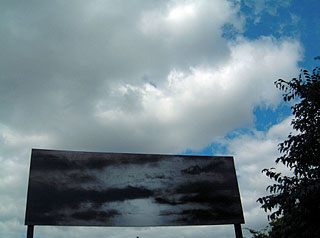- Susanne K. Langer, Reflections on Art
While metafora comes from the Greek "to carry," perception comes from the Latin "to collect." It allows us to apprehend what others have made through metafora and so to formulate a sense of who we are. To perceive is to understand, and we understand inflection because we share the same common utilities for comprehension. We collect information through our senses, and through our abilities of perception, we can manage this information in order to position ourselves in our environment—whether real or virtual—and thus define a large part of who we are.
Brain function is more or less the same in all human beings. In visual perception, for example, the brain breaks down the stimuli it receives from the eye into different components, such as color, line, motion, and position, and reconstructs them into our sense of vision. This intrinsic hard-wired trait enables us all to receive stimuli in essentially the same manner. It is because our perceptions function similarly at this fundamental level that the structures of metafora can be understood from one individual to another.

Socrates Park, New York, 2001
"The essence of perception is the selective attention to something important. And the recognition of what is important is trigger to creativity. The receptive system 'tunes itself' by adjusting the apparatus for clear reception. For example, the lens-retina-nerve-muscle system is not passive but active. It continually creates new stimuli for itself, searching out in an optical array the relations, ratios, grades and invariance of pattern that specify facts of the world. The amount of potential information in the light reaching the eye is unlimited." What we do with that information is a matter of creativity.
The future holds great promise for further widening the doors of our perception. Computer interactivity and multimedia are inter-modal sensory experiences. Arguably, the creative expression of cyberspace is unique as an experience in that it further allows us to differentiate ourselves from our physical surroundings, disconnecting us from them and enabling us to perceive things without the filters and impediments of our corporeal selves. We can fly through space in a metaphorical sense, unaffected by gravity, extending—with whatever prosthesis we can invent—the capabilities of gesture, sound, object, image, and word, through our ability to give them form, color, rhythm, perspective, and style.
- John Locke, An Essay Concerning Human Understanding
